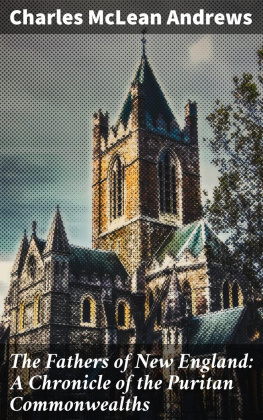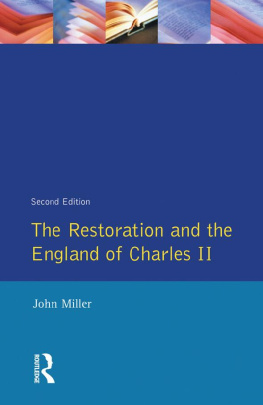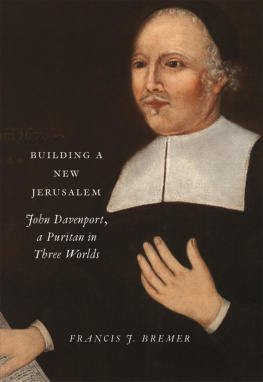ROUTLEDGE LIBRARY EDITIONS: PURITANISM
Volume 4
CHARLES I AND THE PURITAN UPHEAVAL
CHARLES I AND THE PURITAN UPHEAVAL
A Study of the Causes of the Great Migration
ALLEN FRENCH
First published in 1955 by George Allen & Unwin Ltd
This edition first published in 2021
by Routledge
2 Park Square, Milton Park, Abingdon, Oxon OX14 4RN
and by Routledge
52 Vanderbilt Avenue, New York, NY 10017
Routledge is an imprint of the Taylor & Francis Group, an informa business
1955 George Allen & Unwin Ltd
All rights reserved. No part of this book may be reprinted or reproduced or utilised in any form or by any electronic, mechanical, or other means, now known or hereafter invented, including photocopying and recording, or in any information storage or retrieval system, without permission in writing from the publishers.
Trademark notice: Product or corporate names may be trademarks or registered trademarks, and are used only for identification and explanation without intent to infringe.
British Library Cataloguing in Publication Data
A catalogue record for this book is available from the British Library
ISBN: 978-0-367-56981-5 (Set)
ISBN: 978-1-00-311164-1 (Set) (ebk)
ISBN: 978-0-367-62605-1 (Volume 4) (hbk)
ISBN: 978-1-00-311013-2 (Volume 4) (ebk)
Publishers Note
The publisher has gone to great lengths to ensure the quality of this reprint but points out that some imperfections in the original copies may be apparent.
Disclaimer
The publisher has made every effort to trace copyright holders and would welcome correspondence from those they have been unable to trace.
CHARLES I AND THE PURITAN UPHEAVAL
A STUDY OP THE CAUSES OF THE GREAT MIGRATION
BY
ALLEN FRENCH
First published in 1955
This book is copyright under the Berne Convention. Apart from any fair dealing for the purposes of private study, research, criticism or review, as permitted under the Copyright Act 1911, no portion may be reproduced by any process without written permission. Enquiry should be made to the publisher.
George Allen & Unwin Ltd, 1955
Printed in Great Britain
in 12 on 13 point Bembo type
by the Shenval Press,
Simson Shand Ltd.,
London, Hertford and Harlow
this book was written, even to the preface, before the death of Allen French in October, 1946. Failing health, however, prevented him from making the final revision to which he had looked forward.
From the time of its inception I had been in my husbands confidence about the aims of the project, and in both England and America I had shared in the labour of research. Working with a scholar so engrossed in his subject that he was curious to know the precise day of the week on which a given event had occurred, with one who lived and breathed with the people of his narrative, I could not escape the contagion of his enthusiasm. When, later on, I was occasionally asked for my opinion on some bit of evidence I felt that I had been invited into partnership.
After 1946 I considered giving the manuscript to some professional historian, in the hope of seeing it finished; but meanwhile two trusted friends, both of them authors and authorities on historical matters, and both of whom had read parts of the manuscript, suggested that I do the revision myself. After some hesitation I agreed that this was what I most wanted to do. It seemed a natural continuation and a justification of our efforts through all the years. The changes I have made are only such as I thought Allen French would have made, if given the time. For the most part they are condensations. Nowhere, I think, do they involve the least alteration of an opinion or a judgment expressed by the author.
My gratitude for the help and encouragement I have received from Dr. Odell Shepard and Dr. Clifford K. Shipton is beyond expression. Without their patient guidance my share in this work would never have been completed.
The twenty-four large notebooks upon which this book is based are now in the possession of the Massachusetts Historical Society. Their hundreds of photostats bring many documents, as it were, into ones very hands.
aletta lillibridge french
1954
DATING: NEW STYLE
this book keeps as nearly as possible to the New Style rather than the Old in dating: that is, it considers the calendar year as beginning with January 1 instead of March 25. Of the extra eleven days it takes no account, as they are so seldom of importance in a book like this one.

my purpose in writing this book has been to end conjecture about the conditions in England which drove thousands of people to America, and particularly to New England, during the reign of Charles the First. That exodus has long been called the Great Migration. For over two hundred years historians assumed that the early settlers came to escape religious persecution. Edward Johnson, their first historian, and himself an emigrant, made this assumption, without providing any proof, perhaps because he felt that the details of the situation in England were familiar to everyone then living. Cotton Mather, of the second generation born in America, gives us a few facts casually, as if they were common knowledge. Thomas Hutchinson, though a research worker, never touched the question. In Bancrofts great Narrative and Critical History of Massachusetts there is an excellent study of theological differences in seventeenth-century England, but little of their effects upon the individual man. The Commonwealth History of Massachusetts merely glances at the topic in passing. In all these standard works, and in popular belief until recent years, the religious motive has been accepted as the reason for the coming of the first colonists.
But in our day there has grown up, perhaps as an outcome of our debunking period, a theory completely contrary. Equally an assumption, and quite without attempt at proof, this theory denies that religion played any great part in the settlement of New England. Its exponents assert that, except for a few fanatical leaders, the people came for economic betterment alone; that none but a New Englander still steeped in the dregs of puritanism could longer persist in this kind of ancestor worship.
Such flat contradiction in the answer to a question so vital showed that the subject needed to be explored. Our knowledge of the early reign of King Charles rested almost entirely upon the studies of English historians whose main concern was to explain the Civil War. Quite naturally they neglected to bring out the reasons for the departure, before the outbreak of that war, of so small a proportion of the English population, chiefly very humble folk. But, not so naturally, American writers have put almost their wnole attention upon the exodus itself, leaving the causes which led to it unconsidered.













